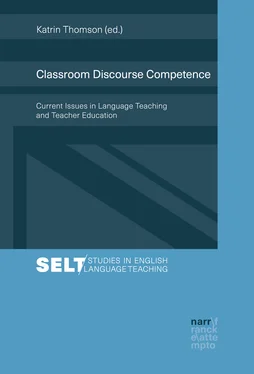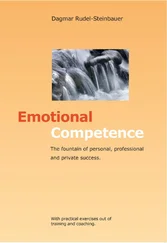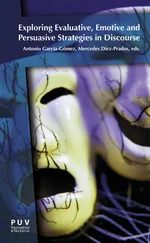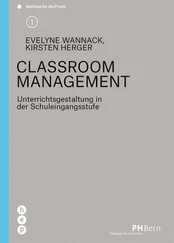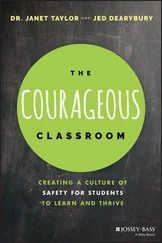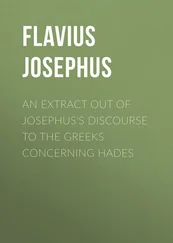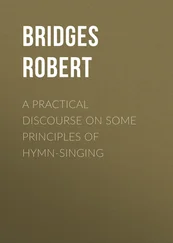In the last chapter of this section, Sandra Stadler-Heerpresents a course concept which aims to foster prospective primary school teachers’ L2 classroom discourse competence through reflective practice (RP) and the use of video-taped micro-teaching (MT) sequences. Course participants, Stadler-Heer explains, are required to design and perform two different MT sequences, each one embedded in teaching/learning contexts that are characteristic for the EFL primary school classroom: story-telling and game-based teaching/learning. The course concept, thus, combines aspects of lesson planning, teaching English to young learners and L2 classroom discourse. Focusing particulary on the development of TEFL students’ reflective competences, Stadler-Heer gives special attention to the various ways of how this can be achieved in the context of pre-service language teacher education (i.e. through post-MT ad-hoc self-reflections, oral peer reflections, written self-reflections using the stimulated recall method). A full transcript of a student’s ad-hoc self-reflection and further material has been made available by the author and can be downloaded from the publisher’s website ( www.meta.narr.de/9783823383741/Zusatzmaterial.zip).
*
In a volume that addresses theoretical, conceptual as well as practical issues of classroom discourse competence and EFL teacher education, it is clearly impossible to cover every facet of the topic or to include the entire body of literature that informs the academic discourse in this field. Thus, this book cannot and does not claim to be exhaustive. It is the editor’s hope, however, that the chapters in this volume will both enrich and further advance the scholarly discussion of CDC. TEFL researchers, university teacher educators, teacher trainers and (prospective) language teachers will hopefully find value in this volume as it may provide them with new insights about the complexity of teachers’ CDC and/or fresh ideas for the various professional contexts individual readers are involved in.
Bausch, Karl-Richard et al. (Eds.) (2000). Interaktion im Kontext des Lehrens und Lernens fremder Sprachen. Tübingen: Gunter Narr Verlag.
Blömeke, Sigrid et al. (2015). “Beyond Dichotomies: Competence Viewed as a Continuum.” Zeitschrift für Psychologie 223:1, 3–13.
Böttger, Heiner (2020). Englisch lernen in der Grundschule. 3 rd, rev. ed. Bad Heilbrunn: Julius Klinkhardt.
Bresges, André et al. (2014). “Einleitung.” In: Bresges, André et al. (Eds.), Kompetenzen diskursiv: Terminologische, exemplarische und strukturelle Klärungen in der LehrerInnenbildung. Münster: Waxmann, 9–14.
Christ, Herbert (2000). “Die Dimension ‘Interaktion’ bei der Erforschung des Lehrens und Lernens fremder Sprachen.” In: Bausch, Karl-Richard et al. (Eds.), 59–67.
Deters-Philipp, Ann-Cathrin (2018). Lehrersprache im Englischunterricht an deutschen Grundschulen. Eine Interviewstudie mit Lehrkräften. Münster: Waxmann.
ECML European Centre for Modern Languages (2019). Teacher Competences for Languages in Education: Conclusions of the Project. Council of Europe. Online. URL: www.ecml.at/Portals/1/5MTP/Bleichenbacher/CEFRLT-conclusions-EN.pdf?ver=2019-11-29-150323-533 (last access: 11.10.2021).
Galaczi, Evelina/Taylor, Lynda (2018). “Interactional Competence: Conceptualisations, Operationalisations, and Outstanding Questions.” Language Assessment Quarterly 15:3, 219–236.
García, Marta (2017). “Unterrichtsinteraktion.” In: Surkamp, Carola (Ed.), Metzler Lexikon Fremdsprachendidaktik. Ansätze – Methoden – Grundbegriffe. Stuttgart: J.B. Metzler, 361.
Gnutzmann, Claus (2000). “Interaktion im Fremdsprachenunterricht: Forschungsgegenstand und Zielsetzung.” In: Bausch, Karl-Richard et al. (Eds.), 89–96.
Hallet, Wolfgang (2017). “Diskursfähigkeit.” In: Surkamp, Carola (Ed.), Metzler Lexikon Fremdsprachendidaktik. Ansätze – Methoden – Grundbegriffe. Stuttgart: J.B. Metzler, 48–49.
Hallet, Wolfgang (2006). Didaktische Kompetenzen. Lehr- und Lernprozesse erfolgreich gestalten . Stuttgart: Klett.
Hallet, Wolfgang/Königs, Frank G. (2010). “ Classroom discourse und Interaktion.” In: Hallet, Wolfgang/Königs, Frank G. (Eds.), Handbuch Fremdsprachendidaktik. Seelze-Velber: Klett Kallmeyer, 190–195.
House, Juliane (2000). “Interaktion und Fremdsprachenunterricht.” In: Bausch, Karl-Richard et al. (Eds.), 111–118.
Janks, Hilary/Locke, Terry (2008). “Discourse Awareness in Education: A Critical Perspective.” In: Hornberger, Nancy H. (Ed.), Encyclopedia of Language and Education. Vol. 6: Knowledge about Language. 2 nded. Boston: Springer, 31–43.
Johnson, Karen E. (1995). Understanding Communication in Second Language Classrooms . Cambridge: Cambridge University Press.
Kirchhoff, Petra (2016). “Was sollte eine gute Englischlehrkraft wissen? Über die Auswahl von Items im FALKO-E Test zum fachspezifischen Professionswissen.” In: Legutke, Michael K./Schart, Michael (Eds.), Fremdsprachendidaktische Professionsforschung: Brennpunkt Lehrerbildung. Tübingen: Narr Verlag, 75–98.
Klippel, Friederike (2003). “Teaching English – Teacher Language in Primary School.” In: Hermes, Liesel/Klippel, Friederike (Eds.), Früher oder später? Englisch in der Grundschule und Bilingualer Sachfachunterricht. Berlin: Langenscheidt, 53–68.
Klippel, Friederike/Doff, Sabine (2012). Englischdidaktik. Praxishandbuch für die Sekundarstufe I und II. 3 rded. Berlin: Cornelsen.
KMK (2019). Ländergemeinsame inhaltliche Anforderungen für die Fachwissenschaften und Fachdidaktiken in der Lehrerbildung. Beschluss der Kultusministerkonferenz vom 16.10.2008 i.d.F. vom 16.05.2019. Online. URL: www.kmk.org/fileadmin/Dateien/veroeffentlichungen_beschluesse/2008/2008_10_16-Fachprofile-Lehrerbildung.pdf (last access: 11.10.2021).
Kuster, Wilfrid et al. (2014). Berufsspezifische Sprachkompetenzprofile für Lehrpersonen für Fremdsprachen. PH St. Gallen. Projektwebsite. Online. URL: www.phsg.ch/de/forschung/projekte/berufsspezifische-sprachkompetenzprofile-fuer-lehrpersonen-fuer-fremdsprachen (last access: 11.10.2021).
Roters, Bianca et al. (2014). “Professionelle Kompetenz von angehenden Englischlehrkräften (PKE).” Poster präsentiert auf der Eröffnungsfeier des Interdisziplinären Zentrums für empirische LehrerInnen- und Unterrichtsforschung (IZeF) der Universität zu Köln am 17.01.2014. Online. URL: www.hf.uni-koeln.de/36292(last access: 11.10.2021).
Roters, Bianca et al. (2013). “Fachdidaktisches Wissen angehender Englischlehrkräfte – Theoretischer Rahmen und empirische Ergebnisse zur Struktur eines Testinstruments.” Lehrerbildung auf dem Prüfstand 6:2, 155–177.
Roters, Bianca et al. (2011). “Professionelles Wissen von Studierenden des Lehramts Englisch.” In: Blömeke, Sigrid et al. (Eds.), Kompetenzen von Lehramtsstudierenden in gering strukturierten Domänen. Erste Ergebnisse aus TEDS-LT. Münster: Waxmann, 77–99.
Thomson, Katrin (2020a). “ Teacher Talk matters : Lehrersprache im Englischunterricht lernförderlich einsetzen.” Themenheft ‘Unterrichtsdiskurs’. Praxis Fremdsprachenunterricht: Englisch 17:4, 4–8.
Thomson, Katrin (2020b). “ Classroom Discourse im fremdsprachenunterrichtlichen Kontext: Gegenstandsbereiche – Einflussfaktoren – Kompetenzentwicklung.” Basisartikel. Themenheft ‘Unterrichtsdiskurs’. Praxis Fremdsprachenunterricht 17:4, 6–9.
Thomson, Katrin (in this volume). “Conceptualizing Teachers’ L2 Classroom Discourse Competence (CDC): A Key Competence in Foreign Language Teaching.” In: Ibid. (Ed.), Classroom Discourse Competence: Current Issues in Language Teaching and Teacher Education. Tübingen: Narr.
Читать дальше
